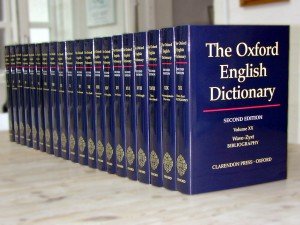 Oxford English Dictionary (OED) is probably one of the most ambitious enterprises in the world of linguistics. Started in 1858, its first edition was only completed seventy years later, with all the subsequent ones following suit – the third one is currently in the works, and although it was initially planned to be ready by 2005, current estimation is a little bit different – 2037.
Oxford English Dictionary (OED) is probably one of the most ambitious enterprises in the world of linguistics. Started in 1858, its first edition was only completed seventy years later, with all the subsequent ones following suit – the third one is currently in the works, and although it was initially planned to be ready by 2005, current estimation is a little bit different – 2037.
Thing of the Past?
However, in our day and age, when the Internet gives you an easy access to dozens of referencing sources, the very necessity of such dictionary is doubted by many. Language has always been fluid and unstable, and all the more now, when new concepts are formed seemingly every day and need words to be coined in order to name them, while old concepts die out along with the words denoting them. Any unified attempt to describe and enumerate every single word in English language will be hopelessly outdated when or if it comes to fruition.
But does it mean that OED is the thing of the past? People working on it now are not so sure. Although they agree that it should change its approach, format and general philosophy of work. It is certain that its current form leaves much to be desired: second 20-volume edition of OED in physical form costs a whopping $995 with a yearly online subscription being $295. Even taking into account its quality it is not the price a lot of people are ready to pay, especially when there are dozens of sources of comparable level available free on the Internet.
What It Will Be Like
New chief editor of OED, Michael Proffitt, is not only sure that they will be able to adapt, he thinks that we live in period when the time of dictionaries has actually come – people need filters much more than in the past. The main plans for the future are concentrated on these directions:
- Links to OED in digitized texts.
- Licensing OED’s data to third parties.
- Promotion of OED among students who seem to be more and more interested in the opportunities provided by web search as opposed to traditional dictionaries.
Even though Mr. Proffitt says that he is going to keep to the traditions of OED and hopes that the third edition of famous dictionary will be available in printed form sometime later, he is not sure that such format has any future. He himself admits that nowadays he only uses a digital version of the dictionary – and from a person who curates the work on it, such a statement should mean something.
Thus, in future we may expect something completely different, completely new, but still called OED.